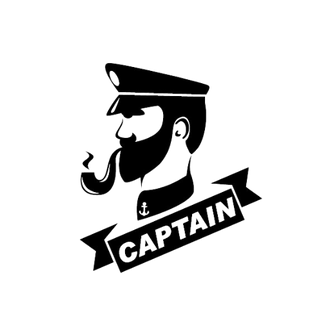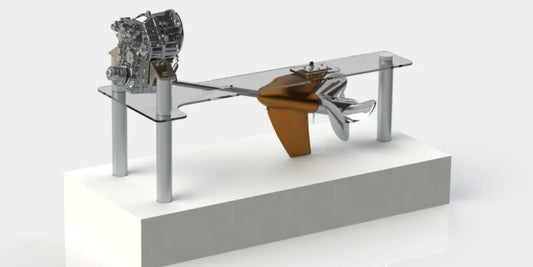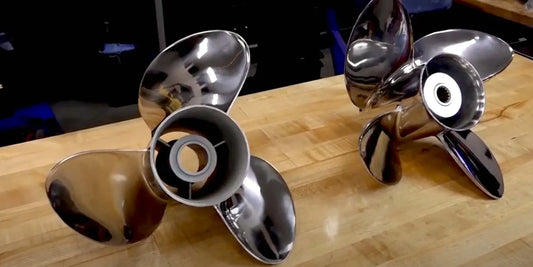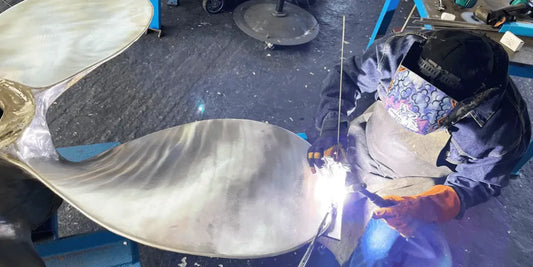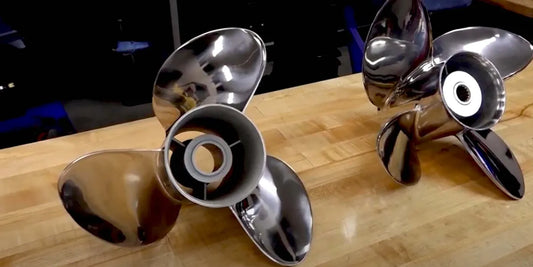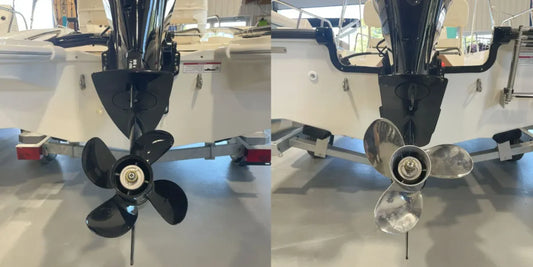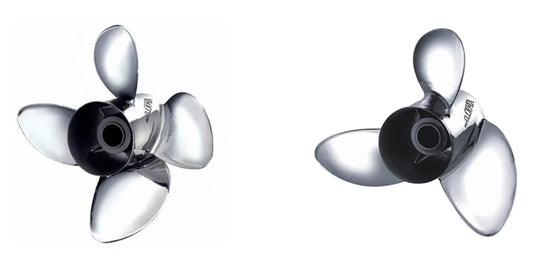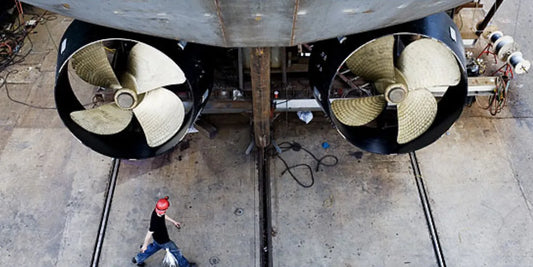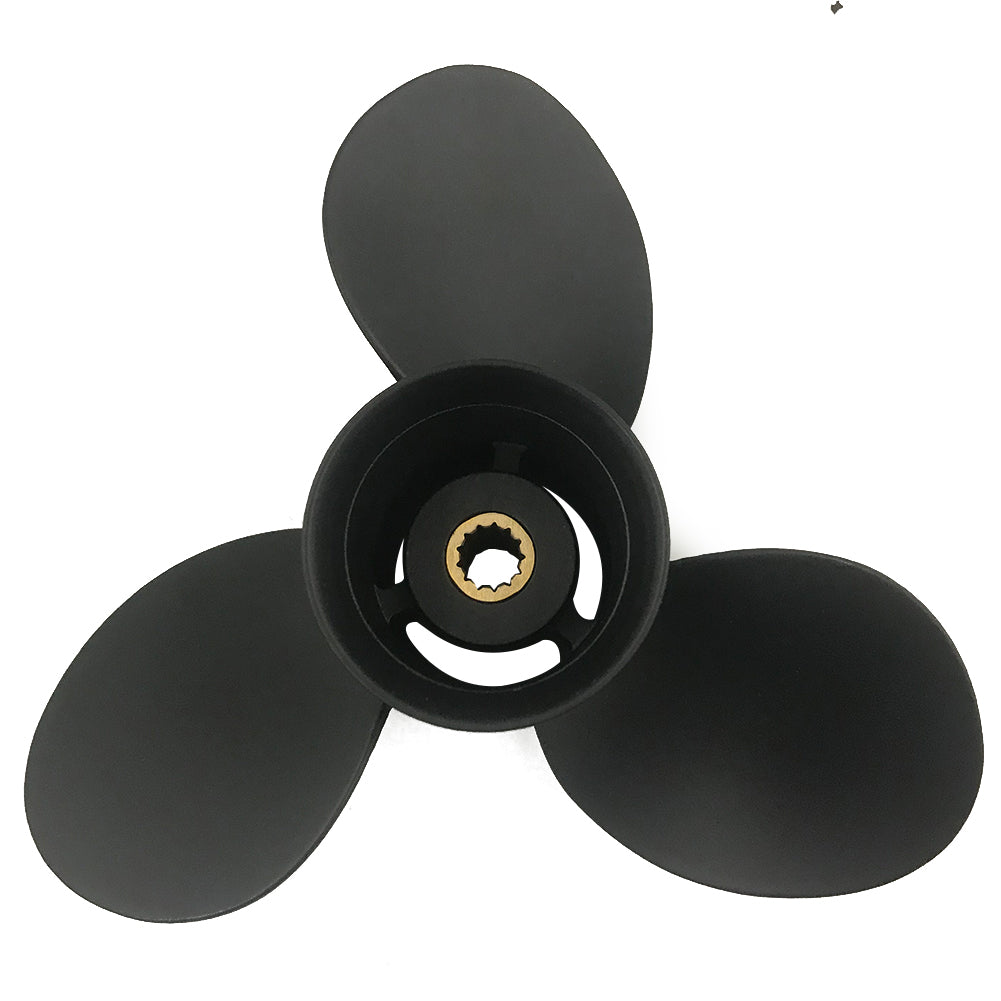The world of marine performance is heavily influenced by innovation and excellence in boat propeller manufacturing. As the driving force behind a boat's propulsion system, propellers play a crucial role in determining speed, efficiency, and overall boat performance. This article explores the leading manufacturers that are at the forefront of propeller technology, transforming the way we navigate our waters with high-performance propellers. From brands like Michigan Wheel, PowerTech, and Mercury to emerging innovators like Sharrow and Veem, these companies are setting new standards in the marine industry.
Understanding Boat Propellers

What Is a Boat Propeller?
A boat propeller is a mechanical device that expels thrust to push a boat by converting rotational energy imparted to it by an engine. It typically consists of two or more blades arranged around a central hub, where the blades rotate about a shaft. The diameter and pitch of the propellers also affect their performance; these are each designed depending on the specific marine application. The manufacturers best known for precision marine propellers are Solas and Acme, which supply aluminum and stainless steel propellers to suit various boating needs, providing optimal propulsion and vessel control.
Boat Prop Types: Outboard Versus Inboard
Boat propellers are generally divided into two categories: outboard and inboard propellers. An outboard propeller is primarily used in smaller boats with an engine mounted outside the hull, offering greater versatility and ease of maintenance. Conversely, the inboard propeller would mainly be utilized by larger crafts as the engine is inside the hull. They both differ in terms of use; thus, manufacturers produce specialized high-performance outboard and inboard propellers, such as those from Volvo Penta and Mercury, respectively. Knowing the differences between the two kinds is thus essential in allowing one to choose the right propeller that meets specific boating needs.
Design Matters in Performance
The design of the propeller is a highly influential factor on the performance of a particular boat on the water. Design aspects include the shape of the blades, their number, and their materials; in other words, every parameter plays a part in determining propulsion efficiency. It is an instrument designed for optimal performance, utilizing high-quality components from manufacturers such as Michigan Wheel and PowerTech, which base their designs on gamma ray precision to produce maximum thrust and minimal cavitation. From 4-blades stainless steel propellers to futuristic hub kits, by design, a propeller manufacturer can truly enhance the speed, fuel economy, and handling of a boat.
Top Boat Propeller Manufacturers

1. YiFuHui
Year Founded: 2006
Introduction: YiFuHui is a global leader in the production and supply of high-quality plastic resin pellets. Based in China, YiFuHui has built a reputation for its advanced manufacturing processes and commitment to sustainability.
Main Products: Polyethylene (PE), polypropylene (PP), polyvinyl chloride (PVC), and custom-engineered resin solutions.
Key Advantages:
- Competitive pricing backed by efficient production techniques.
- Offers a diverse range of products tailored to different industries, ensuring flexibility.
-
Focus on sustainable and recyclable resin options aligns with increasing global environmental regulations.
Key Disadvantages: - Geographical distance may result in longer shipping times for customers in North America or Europe.
-
Smaller selection of specialty resins compared to some competitors.
Website: YiFuHui Official Website
2. Dow Inc.
Year Founded: 1897
Introduction: Dow Inc. is a globally recognized materials science company, well-known for its extensive portfolio of plastic resins, polymers, and related products.
Main Products: Polyethylene, polyurethane, elastomers, and specialty polymers.
Key Advantages:
- Long-standing expertise and a global distribution network.
-
Strong emphasis on research and innovation ensures high-quality products.
Key Disadvantages: -
Higher costs compared to some regional suppliers.
Website: Dow Inc. Official Website
3. BASF
Year Founded: 1865
Introduction: BASF is one of the world’s largest chemical producers, offering a comprehensive range of high-performance resin pellets sought after in industries such as automotive, consumer goods, and construction.
Main Products: Polyamide, polybutylene terephthalate (PBT), and specialty engineering plastics.
Key Advantages:
- Broad product portfolio with solutions for nearly every application.
-
Established R&D infrastructure drives continuous improvement.
Key Disadvantages: -
Premium pricing.
Website: BASF Official Website
4. SABIC (Saudi Basic Industries Corporation)
Year Founded: 1976
Introduction: SABIC is a world-leading manufacturer of high-quality plastic resins and chemicals, based in Saudi Arabia.
Main Products: Polyethylene, polypropylene, polycarbonate, and specialty resins.
Key Advantages:
- Strong focus on innovation and sustainability.
-
A robust global presence ensures reliable supply chains.
Key Disadvantages: -
Dependence on the Middle Eastern supply routes can influence logistics.
Website: SABIC Official Website
5. ExxonMobil
Year Founded: 1870
Introduction: ExxonMobil, a leading energy company, also specializes in the production of advanced polymer resins widely used across industries.
Main Products: Polypropylene, polyethylene, and performance polymers.
Key Advantages:
- Advanced proprietary technologies result in high-efficiency products.
-
Global reach ensures product availability in major markets.
Key Disadvantages: -
Focused primarily on larger industrial clients, limiting access for smaller businesses.
Website: ExxonMobil Official Website
6. LyondellBasell
Year Founded: 2007
Introduction: LyondellBasell is a multinational chemical company specializing in the manufacture of plastic resins and polymer solutions.
Main Products: Polyethylene, polypropylene, and engineered plastics.
Key Advantages:
- Known for high-performance products and advanced technology solutions.
-
Strong sustainability initiatives.
Key Disadvantages: -
Limited accessibility in certain regional markets.
Website: LyondellBasell Official Website
7. Formosa Plastics Corporation
Year Founded: 1954
Introduction: Formosa Plastics is a leading Taiwanese manufacturer of resins and petrochemical products with a robust portfolio.
Main Products: Polyethylene, polypropylene, and PVC.
Key Advantages:
- Competitive market pricing.
-
Reliable production consistency.
Key Disadvantages: -
Limited breadth of specialty resin offerings.
Website: Formosa Plastics Official Website
8. Chevron Phillips Chemical Company
Year Founded: 2000
Introduction: This joint venture between Chevron and Phillips Petroleum Company offers a diverse range of plastic resin products.
Main Products: Polyethylene, high-performance polymers, and specialty compounds.
Key Advantages:
- Strong focus on sustainable manufacturing processes.
-
Excellent customer service and technical support.
Key Disadvantages: -
Pricing on the higher side for specialized products.
Website: Chevron Phillips Official Website
9. INEOS
Year Founded: 1998
Introduction: INEOS is a global manufacturer of chemical products, including a variety of resins used across industrial and consumer applications.
Main Products: Polyethylene, polypropylene, and specialty resins.
Key Advantages:
- Strong focus on efficiency and manufacturing scale.
-
Globally competitive pricing.
Key Disadvantages: -
Some regions report intermittent supply chain issues.
Website: INEOS Official Website
10. DuPont
Year Founded: 1802
Introduction: DuPont is a pioneer in material science with a diverse portfolio of products, including plastic resins and engineered materials.
Main Products: Polyacetal, polyamide, and performance resins.
Key Advantages:
- High-performance solutions tailored for advanced applications.
-
Renowned brand reputation in material innovation.
Key Disadvantages: -
Typically higher costs compared to competitors.
Website: DuPont Official Website
Factors Influencing Propeller Performance

Understanding Engine Compatibility and Performance
The compatibility of a boat's engine and propeller is crucial for achieving maximum performance while on the water. Both Michigan Wheel and PowerTech propeller manufacturers design their products to meet the specific requirements of a particular engine, aiming to enable the propeller to convert the engine's power into thrust efficiently. A propeller's diameter, its pitch, and even the material of which it is made, be it aluminum or stainless steel, are determining factors of the adequacy of its interface with the engine. Choosing a propeller that fits well with the engine makes it perform better as a thrust-providing apparatus while permitting the engine to remain in good health."
Cavitation: A Proximity Injury to Efficiency
One of the most impactful phenomena in the efficiency and performance of a boat propeller is cavitation. This occurs when water vapor bubbles form on the surface of a propeller blade as the pressure falls below the water vapor pressure. These bubbles collapse violently, eroding the blade surface and contributing to a drop in propeller efficiency. Manufacturers such as Sharrow and Veem incorporate technology in their designs to reduce cavitation at various stages, ensuring stainless steel material usage for strength and performance. By solving the problem of cavitation, manufacturers can provide propellers with greater durability and reliability, resulting in improved marine propulsion.
Years of Experience: How It Shapes Manufacturer Quality
The whole industry experience plays a key role in determining the quality of boat propellers. Giants like Mercury and Volvo Penta have been in the business for a century, refining the art and science of propeller design and manufacture. This vast experience has enabled them to design propellers that perform at the highest level under the most stringent conditions in the marine sector. With a strong knowledge of materials science, hydrodynamics, and customer needs, these manufacturers continually push the envelope to produce products that exceed expectations. Their established reputation assures customers that the boaters can enter the water with confidence in propulsion, ensuring reliability and efficiency.
Choosing the Right Boat Propeller

Needs and Uses of Your Boat
Choosing the boat propeller best suited for a given boat requires a thorough assessment of the specific needs of that boat and its intended use. Among considerations that come to mind are the type of water in which one is cruising: are they calm lakes or rough seas? Then there is the question of the load it generally carries. Lastly, are there any speed requirements? Boat design is also a key consideration: Is it an outboard or inboard engine? Common market players, such as Solas and PowerTech, produce marine propellers tailored to various boating applications, ensuring each propeller performs optimally in terms of speed and efficiency once on the water.
Performance Criteria: What Matters in a Propeller
Selecting the right boat propeller is one of the most essential steps. Diameter, pitch, and blade count have a significant impact on the propeller's speed and efficiency. For instance, a 4-blade propeller may offer better acceleration and smoother operation, whereas a 3-blade propeller might provide slightly more speed at the top end. High-performance propellers are designed according to these considerations by Michigan Wheel and Mercury, which enhance overall boat performance. The other major factor is the material, which is aluminum and stainless steel; this provides greater durability against wear and tear, allowing it to withstand various marine environments for many years.
Let's Find Out If It Really Works
Price versus performance is one of the primary considerations in selecting a boat propeller. High-end propellers from manufacturers such as Veem and Sharrow are packed with the latest technology and innovation, but often come at a higher cost. On the contrary, brands such as Acme and Solas offer cheaper alternatives, but never as a substitute for quality. It would serve one well to have the pros of advanced propeller design in balance with budget constraints to find a propeller that satisfies both price and performance needs. This will ensure performance and create that perfect boating experience.
The Future of Boat Propellers

Design Trends in Propeller Technology
Emerging technical trends are shaping the future of boat propellers. To enhance efficiency and performance, manufacturers are developing innovations. Regarding materials, developments in advanced composites, as well as better stainless steel alloys, are promising higher durability and a better strength-to-weight ratio. On the other hand, innovative technology is being integrated into boats, enabling real-time analysis of propeller performance so that adjustments can be made on a case-by-case basis. Manufacturers such as Sharrow and PowerTech are leading this progress by evolution and innovation, where their designs reduce cavitation and improve propulsion, setting new benchmarks for the marine industry.
Environmental Considerations in Propeller Design
Amid the rising concern for the environment, the trend among boat propeller manufacturers is towards sustainability. This means creating propellers that cause less noise pollution, improve fuel efficiency, and thereby reduce the environmental impact of boats. More emphasis is also being placed on materials and processes that are environmentally friendly. Mercury and Volvo Penta lead the way in designing eco-friendly propellers that enhance boat performance while conserving marine ecosystems. Thereby, these form part of the global initiatives for sustainable marine practice.
Predictions for the Next Decade in Marine Performance
Over the past few years, significant advancements have been made in marine performance, particularly with propeller-on technology. Expectations point toward more customization versus adaptability of options in propeller so that the boating public may set their own propulsion for an intended use. Improvements in propeller design and production are expected to yield enhancements in speed, efficiency, and maneuverability, with Veem and Michigan Wheel being among the leaders. With ongoing technological advancements, the marine world is poised to integrate high-performance propulsion systems with intelligent systems for unprecedented control and efficiency while on the water.
Reference Sources
-
VIF Prop - Best Boat Propeller Manufacturers: Highlights leading brands like Mercury and their contributions to the industry.
-
VIF Marine - Best Boat Propeller Manufacturer: Profiles major brands such as Yamaha, Solas, Michigan Wheel, and Volvo Penta.
-
VIF Prop - Solas Propellers: Focuses on Solas, a top-tier brand for both recreational and commercial boating.
-
Boats.net - Tips for Choosing Boat Propellers: Discusses popular brands like Solas and their product range.
-
BoatTest - Sharrow Propeller™: Features the innovative Sharrow Propeller, a patented design revolutionizing marine performance.
Frequently Asked Questions (FAQs)
What kind of variances are there in boat propellers sold by flagship companies?
Top manufacturers of boat propellers offer a whole gamut of products, including 3-blade types and 4-blade designs. Each configuration might be suitable for high-performance use or for recreational boating. A few manufacturers may insist on aluminum and stainless steel boat propellers for their durability and efficiency. Moreover, depending on whether they're being fitted to an outboard or to an inboard, the choice of prop must differ. Knowing can help boaters choose the best prop for their performance needs.
How does the outline of a propeller affect its working and fuel economy?
The very design of the propeller acts as a determinant for the craft's performance and fuel economy. They keep more cavitation and vibration away, thus providing smooth running and deft handling. Many manufacturers utilize CNC machines for production, ensuring each piece receives the utmost precision. Depending on the chosen design, thrust can be optimized while considering the efficiency of the given combination of boat and engine. Many companies have been conducting research and development for years to create innovative designs that seek to maximize performance and reduce fuel consumption.
What considerations should I take into account when selecting a new propeller for my boat?
When deciding on a new prop for your boat, some key objectives to consider include the engine type, the weight of the boat, and the nature of the job to be done, whether it involves skiing, fishing, or cruising. Then, the type of material the prop is made of must be analyzed. Aluminum is the most cost-effective option, whereas stainless steel offers the best quality and durability. The number of blades also affects the performance aspect; for example, 3-blade versus 4-blade configurations. Additionally, some manufacturers may offer OEM versions of their propellers, specifically designed for specific boat models. Such a situation will ensure better compatibility and maximum performance.
How do boat propeller manufacturers make sure that the quality of their products is the highest?
New-generation boat propellers are made with CNC-machined precision for the highest quality. Many top-end manufacturers have patented propeller designs meant to increase wear resistance and improve performance. Quality control is exercised at every step, from the selection of raw materials to the final stage of inspection. Manufacturers with years of experience have built a reputation for reliability and innovation, leveraging decades of expertise. These manufacturers may also have complete product lines for almost any type of boating.
What are recent innovations in the field of boat propeller manufacturing?
Recent technological advancements have led to the development of high-performance propellers with noise and vibration reduction properties. IPS (Inboard Performance System)-type technologies have revolutionized hull-propeller interaction, leading to higher efficiency. Currently, extensive research is being conducted to design propellers with improved fuel economy and enhanced overall handling. Additionally, material advancements in composite grades are enabling manufacturers to offer boaters a better alternative for lightweight and durable propellers with enhanced performance characteristics.
How can I find trustworthy manufacturers of boat propellers?
To locate reliable boat propeller manufacturers, start by researching the top brands recognized for their quality and innovation. Look to manufacturers who have been in the field for many years, as this experience should translate to high-quality products. You want to, if possible, read customer reviews and testimonials on how good their propellers are. Another way is to attend boating trade shows or expos to establish a direct connection with manufacturers and review their product lines. Recommendations from fellow boaters or marine shops in your local area will also be of great help.
